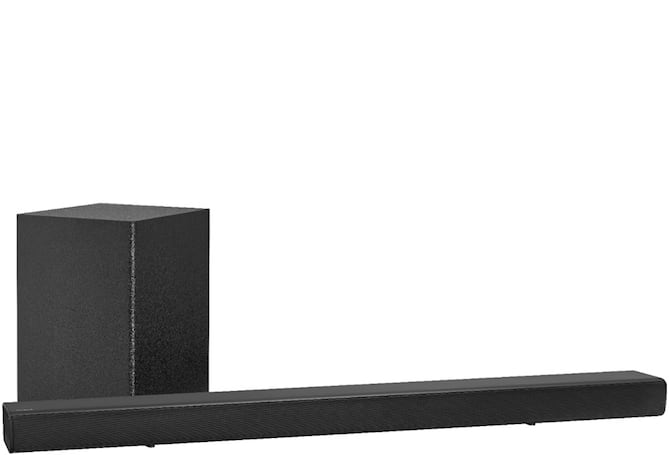Choosing the Best Sound Bar for a Home Entertainment Setup

Best Selling Products carousel(6 Items)
High-quality audio can have a great impact on your home entertainment experience. From a home theater or outdoor kitchen to entertaining guests or gaming, a good sound system is a key part of playing or streaming movies and TV, games, videos, music and podcasts. While surround sound has long been recognized as the gold standard for theatrical-quality home audio, sound bars have made a lot of headway in recent years.
As a less expensive and less complicated alternative to complex speaker setups, sound bars offer a high-fidelity sound that’s paired with convenience and easy installation. Audiophiles and casual listeners alike will find that these audio enhancers are a great addition to any home audio setup, but which sound bar is best for you?
What is a sound bar and how do they work?
A sound bar, or speaker bar, is an audio device that projects powerful sound from one central bar-shaped unit.
With so many types of sound bars available, there are options for many different uses. A wireless sound bar might be ideal for someone who wants more portable audio that can be moved from room to room. A Bluetooth sound bar gives the option of being paired with different devices. TV sound bars can be tailored specifically for your TV or home theater, including being placed on sound bar mounts for a more permanent setup. You might even choose a sound bar with a subwoofer, which can provide an even better quality of sound.
How to choose the best sound bar for your space
Choosing a sound bar for your home entertainment setup is easy when you know what to look for. Here's a guide to help you find the best sound bar for your space:
- Determine a budget. Sound bars are available in various price ranges, from budget-friendly options to high-end models. Take time to review the specifications of different models you’re interested in and choose the one that offers you the closest match for your price point and technical preferences.
- Check the audio output on your TV. Most modern TVs have an HDMI or optical audio output. Make sure the sound bar you choose has a corresponding input to match your TV’s output. If not, there are many adapters available.
- Consider the size and design of the sound bar. Measure the area where you plan to place the sound bar. Ensure that the sound bar fits in the space without blocking or compromising sound while also complementing other items in your setup.
Sound bar configuration
Configuring a sound bar is crucial to achieving the best possible audio quality. Common configurations include:
- Single-unit sound bars: These are self-contained sound bars that house all the speakers in a single unit. They are suitable for smaller spaces and provide a basic audio upgrade from TV speakers, computer speakers or smaller portable speakers.
- Sound bar with subwoofer: This configuration includes a separate subwoofer that enhances bass tones. It delivers a rich, deep sound, making it ideal for larger rooms, outdoor spaces or for those who enjoy a more immersive audio experience.
- Sound bar with surround speakers: This option includes wireless surround speakers that can be installed in other locations within the space. Paired with a sound bar, surround sound will greatly enhance the audio and create a more cinematic audio experience, especially in a home theater setup.
Audio quality and features
Look for sound bars that offer high-quality audio and have features that match your preferences. Consider the following features to help learn what works best for you:
- Audio formats: Check that the sound bar supports the audio formats you prefer, such as Dolby Atmos or DTS:X, for a more immersive experience. Your home theater components, like your TV or streaming device, can give you some insight about which audio formats are best suited for a speaker setup.
- Connectivity options: Check for additional connectivity options like Bluetooth or Wi-Fi, which can allow you to stream music wirelessly from your other devices, like a phone or laptop.
- Equalizer settings: Look for sound bars that provide customizable sound settings, which allow you to adjust bass, treble and other audio parameters according to your preferences and space.
- Smart features: Some sound bars come with built-in voice assistants like Amazon Alexa or Google Assistant, which can be convenient if you want to control your sound bar using voice commands.
It’s also important to research different sound bar models online, read customer reviews and compare features to get a better idea of what is out there. And if possible, visiting a physical Best Buy store and looking and listening to sound bars on display can help you find the best sound bar for you.